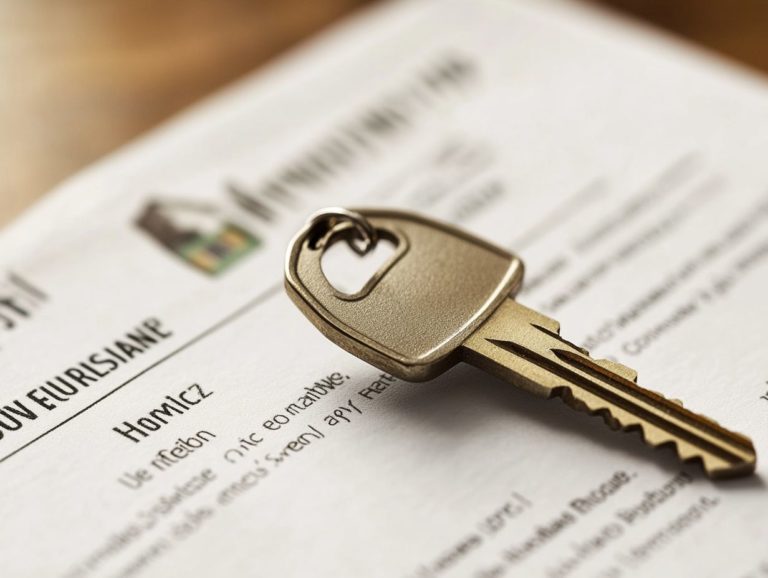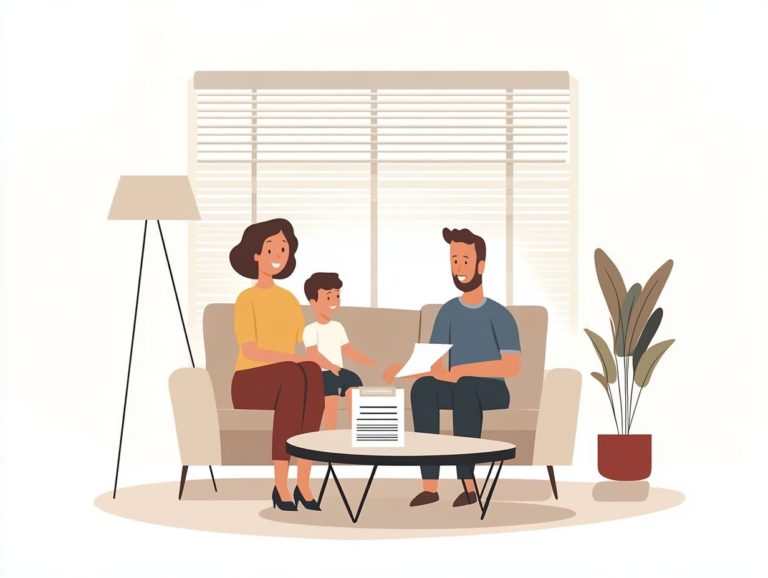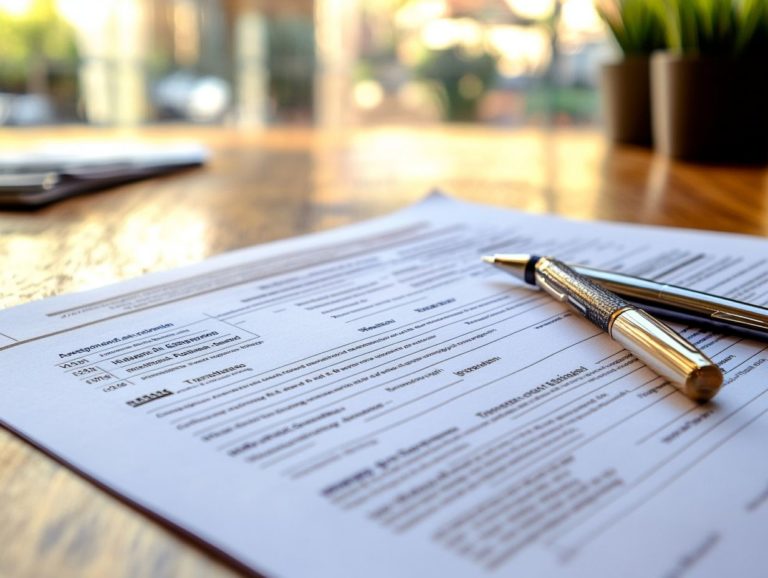How to Evaluate Your Home Insurance Needs?
Home insurance stands as a vital shield for your most significant investment your home.
Grasping its intricacies empowers you to make informed decisions regarding your coverage. This article delves into the essential aspects of home insurance, guiding you through the various types of coverage available and helping you evaluate your specific needs.
You ll learn how to assess your assets and risks, navigate the complexities of premiums and deductibles, and explore additional coverage options such as flood and earthquake insurance.
We ll also highlight the importance of regularly reviewing your policy to ensure you re adequately protected. Dive in to uncover the best strategies for securing your home effectively!
Contents
- Key Takeaways:
- Understanding Home Insurance
- Assessing Your Home Insurance Needs
- Factors to Consider When Choosing Home Insurance
- Additional Coverage Options
- Reviewing and Updating Your Home Insurance
- Frequently Asked Questions
- What factors should I consider when evaluating my home insurance needs?
- How can I determine the appropriate coverage amount for my home insurance?
- Should I review my home insurance needs regularly?
- What types of coverage should I consider?
- Can I bundle my home insurance with other types of insurance?
- What should I do if I need to make changes to my home insurance coverage?
Key Takeaways:

Understand the basics of home insurance and the different types of coverage available before evaluating your specific needs. It’s also wise to consider what to do before buying home insurance.
Consider your assets and potential risks when determining the amount of coverage and type of policy that best fits your situation.
Regularly review and update your home insurance policy to ensure it adequately reflects changes in your assets, risks, and coverage options.
Understanding Home Insurance
Let’s explore how home insurance can give you peace of mind! Grasping the nuances of home insurance is essential for homeowners, as it includes important parts that protect your most significant investment your home.
Homeowners insurance primarily covers property damage, including losses from natural disasters such as floods or fires, alongside personal property protection. It is designed to mitigate financial risks, allowing you to recover from unforeseen events and manage liabilities with confidence.
The intricacies of policies, coverage limits, premiums, and the role of insurance agents are all pivotal in helping you develop a thorough understanding of how this insurance works to safeguard your valuable assets.
What is Home Insurance?
Home insurance, often referred to as homeowners insurance, is an essential policy crafted to shield your residential property from a range of risks, including fire, flood, and other catastrophic events.
This vital coverage not only protects the physical structure of your home but also extends to your personal belongings, ensuring that items like furniture, electronics, and clothing are safeguarded against theft or damage.
Homeowners insurance also provides liability coverage, giving you peace of mind in the event that someone is injured on your property.
It embodies a comprehensive approach, typically featuring various add-ons to your policy that cover specific risks, such as natural disasters and liability concerns. You can adjust your policy for better security and peace of mind.
Types of Coverage
Homeowners insurance policies encompass a variety of coverage types, each designed to offer you distinct protections and benefits against a range of risks.
At the heart of these policies is dwelling coverage, which serves as a fundamental safeguard for the physical structure of your home against hazards like fire or storm damage. Meanwhile, personal property coverage ensures that your valuable belongings be it furniture or electronics are protected against theft or destruction.
Liability insurance is another vital component, offering you protection from legal claims that may arise if someone is injured on your property. Many policies also include provisions for additional living expenses, allowing you to maintain your quality of life while repairs are underway.
You might also want to explore various endorsements to further enhance your coverage, addressing specific risks that standard policies may not encompass.
Assessing Your Home Insurance Needs
Assessing your home insurance needs is a crucial step in safeguarding your property and personal assets from potential risks and damages. Don’t wait until it’s too late; find the best home insurance for your needs and ensure you have the right coverage today!
This process requires you to evaluate your assets, appreciate the unique features of your home, and consider the financial implications of risks like fire, flood, or theft. To better understand these risks, check out how to identify potential home insurance risks.
Creating a detailed home inventory can clarify the value of your personal belongings, while a thorough understanding of your policy coverage ensures you aren’t left underinsured or overpaying for premiums.
Engaging with insurance agents can also offer valuable insights into the appropriate coverage limits and endorsements you may need to consider.
Contact an insurance agent today to find the best coverage for you!
Evaluating Your Assets and Risks

Evaluating your assets and risks is a crucial first step in determining the right level of homeowners insurance coverage for your needs. Before diving in, consider what you should do before getting home insurance, including the unique features of your property, its age, location, and any renovations you’ve made. These factors play a pivotal role in your assessment.
By understanding these elements, you can pinpoint specific vulnerabilities that may require additional coverage. For example, if your home is situated in a flood-prone area, you might need specialized flood insurance. If you own a property with antique structures, increased liability coverage could also be beneficial.
Don t overlook the importance of thoroughly calculating the value of your personal belongings. This will guide your decisions between replacement cost and actual cash value. A comprehensive analysis ensures that you re adequately protected from the potential risks and financial pitfalls that accompany homeownership.
Factors to Consider When Choosing Home Insurance
When selecting home insurance, evaluate a range of factors that can profoundly influence your coverage options, including how to make your home insurance more affordable.
- Premiums
- The amount you pay out of pocket before insurance kicks in
- Coverage limits
Premiums and Deductibles
Insurance premiums and deductibles are essential elements that significantly affect the overall cost and coverage of your homeowners insurance policy. Understanding how these premiums are calculated can offer valuable insights into managing your coverage effectively.
Insurers typically evaluate various factors, including your property’s value, its location, and risk elements like your previous claims history. The interplay between premiums and deductibles is particularly noteworthy generally, opting for a higher deductible can lead to lower premiums. It s vital for you to find the right balance that aligns with your financial landscape.
When financial challenges arise, these components can greatly influence your situation. Higher premiums may strain your budget, while substantial deductibles could pose challenges during critical times.
Policy Coverage Limits
Policy coverage limits dictate the maximum amount an insurance company will pay for covered losses. Understanding these limits is essential when selecting a policy.
These limits are directly tied to the value of your property. If you choose a coverage limit that s too low, you could face significant financial risks when it comes time to file a claim.
Imagine a catastrophic event, like a natural disaster, striking your home, and the expenses surpass your coverage limits. You would be left to cover the remaining costs yourself.
This reality highlights the importance of regularly assessing property values to ensure your coverage limits reflect the current worth of your home. This ultimately minimizes potential financial hardship during turbulent times.
Additional Coverage Options
As a homeowner, you may discover a range of additional coverage options designed for those seeking enhanced protection beyond standard policies. This becomes especially relevant when considering specific risks, such as flood or earthquake damage.
Flood and Earthquake Insurance

Flood and earthquake insurance are crucial additions for homeowners in areas at risk of these specific natural disasters. If you reside in a region prone to such destructive forces, securing these policies isn t just a smart move it s essential.
Standard homeowners insurance often falls short, leaving you vulnerable to significant financial risks when facing the aftermath of flooding or tremors. The unpredictability of these events calls for a proactive strategy. Even a minor flood or earthquake can lead to extensive repairs and considerable losses.
By investing in these specialized insurances, you enhance your existing coverage, ensuring you are better protected against the financial ramifications of such catastrophic occurrences.
Reviewing and Updating Your Home Insurance
Regularly reviewing and updating your home insurance is crucial. It ensures your coverage matches your current financial situation and the true value of your property.
This step protects your assets and gives you peace of mind. You ll know you re covered against unexpected events.
When to Re-evaluate Your Policy
Re-evaluate your insurance after significant life changes, major events, or shifts in property value. To ensure you have the right coverage, consider exploring how to prepare for a home insurance renewal.
It’s important when adapting to new circumstances. For example, welcoming a growing family may require more coverage, especially if you’ve renovated your home.
If you experience a financial shift like job loss, retirement, or a raise review your homeowners insurance for peace of mind.
Also, assess your coverage after acquiring valuable items or enhancing home security. For more guidance on this process, check out how to prepare for a home insurance renewal. These changes greatly affect your risk and insurance needs.
Frequently Asked Questions
What factors should I consider when evaluating my home insurance needs?
Consider the value of your home and the cost to rebuild or repair it. For more insights, you can explore how to understand your home insurance policy. Also think about the age and condition of your home, the risks in your area, and the value of your belongings.
How can I determine the appropriate coverage amount for my home insurance?

Conduct a home inventory to assess your belongings and the risks in your area. Consulting with an insurance agent can also help ensure you have enough coverage, especially to understand why you need home insurance.
Should I review my home insurance needs regularly?
Yes, regularly review your insurance, especially after changes to your home or belongings. Keeping your coverage up-to-date is essential.
What types of coverage should I consider?
Common coverages include dwelling coverage for your home s structure, personal property coverage for your things, liability coverage for lawsuits, and additional living expenses for temporary housing after a disaster.
Can I bundle my home insurance with other types of insurance?
Yes! Many companies offer discounts for bundling home insurance with auto or life insurance. This can save you money overall.
What should I do if I need to make changes to my home insurance coverage?
If you need to make changes like adjusting coverage amounts or updating personal information contact your insurance agent or company. They can help you make those adjustments.






